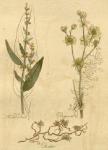Dodder.
A VERY strange and singular plant, but not uncommon with us. It consists of only stalks and flowers, for there are no leaves, nor the least resemblance of any. The stalks are a foot or two in length, and they fasten themselves to other plants; they are of a purplish colour, as thick as a small pack-thread, and considerably tough and firm. These wind themselves about the branches of the plants, and entangle themselves also with one another in such a manner, that there is no end of the perplexity of tracing and unfolding them. The flowers grow in little heads, and are small and reddish, four little seeds succeed to each of them.
Dodder is best fresh gathered; it is to be boiled in water with a little ginger and allspice, and the decoction works by stool briskly; it also opens obstructions of the liver, and is good in the jaundice, and many other disorders arising from the like cause.
The dodder which grows upon the garden thyme, has been used to be preferred to the others, and has been supposed to possess peculiar virtues, from the plant on which it grows; but this is imaginary: experience shews it to be only a purge as the other, and weaker. The common dodder is preferable to it with us, because we can gather it fresh, the other is imported, and we only have it dry; and it often loses a great deal of its virtue in the hands of the druggist.


